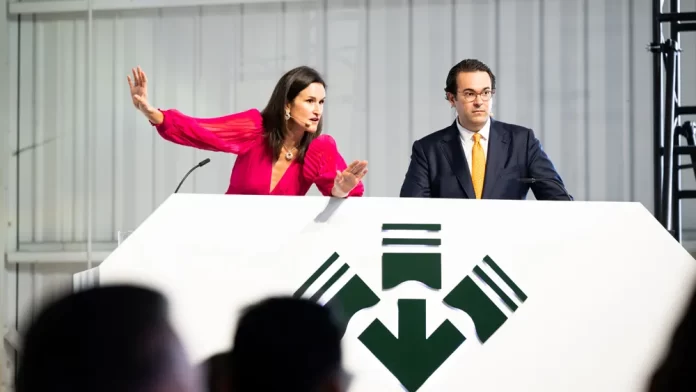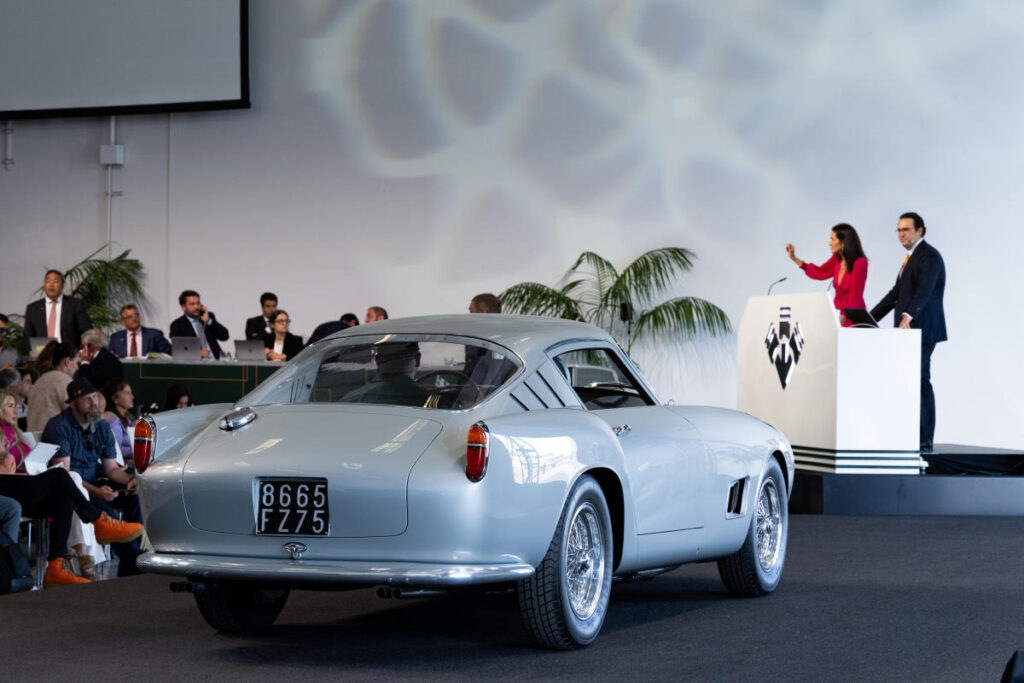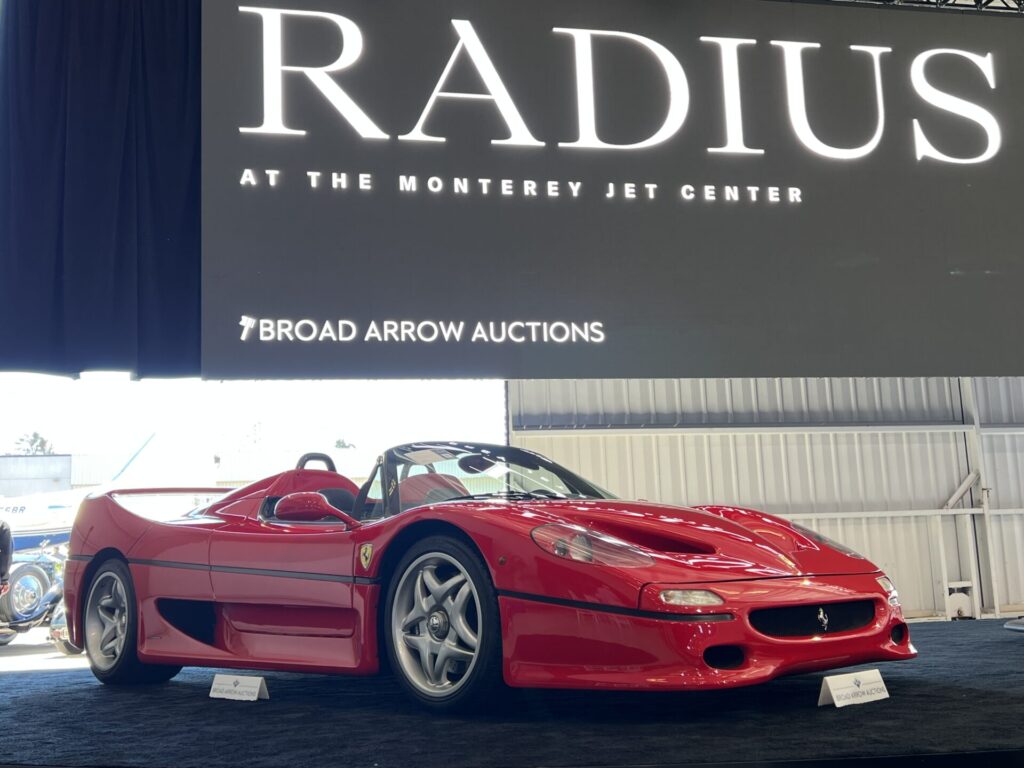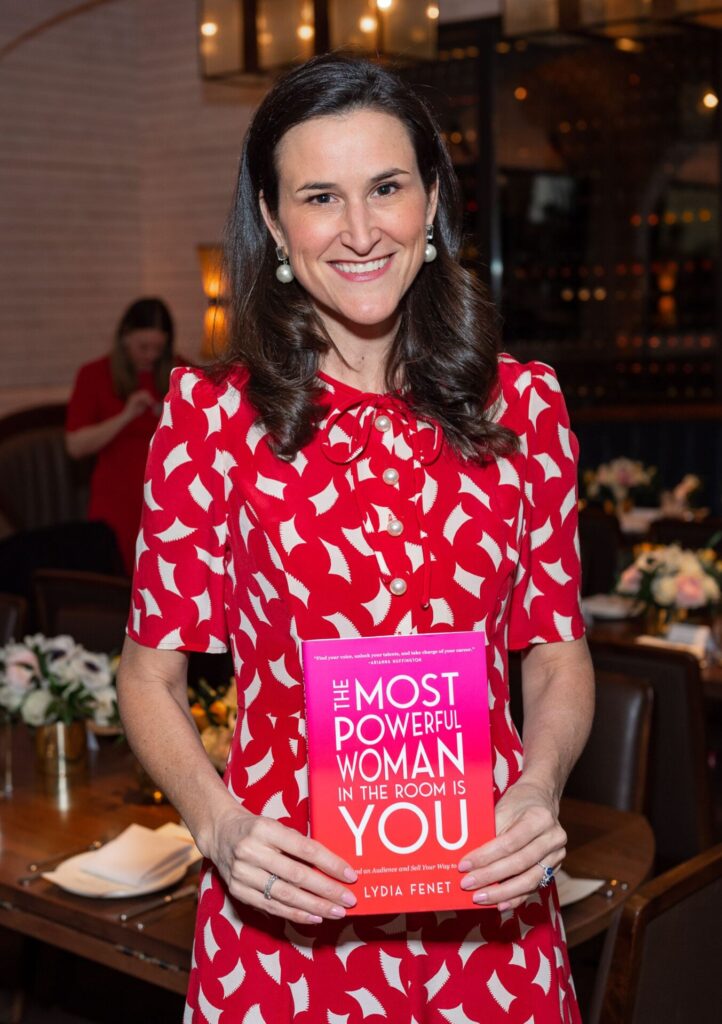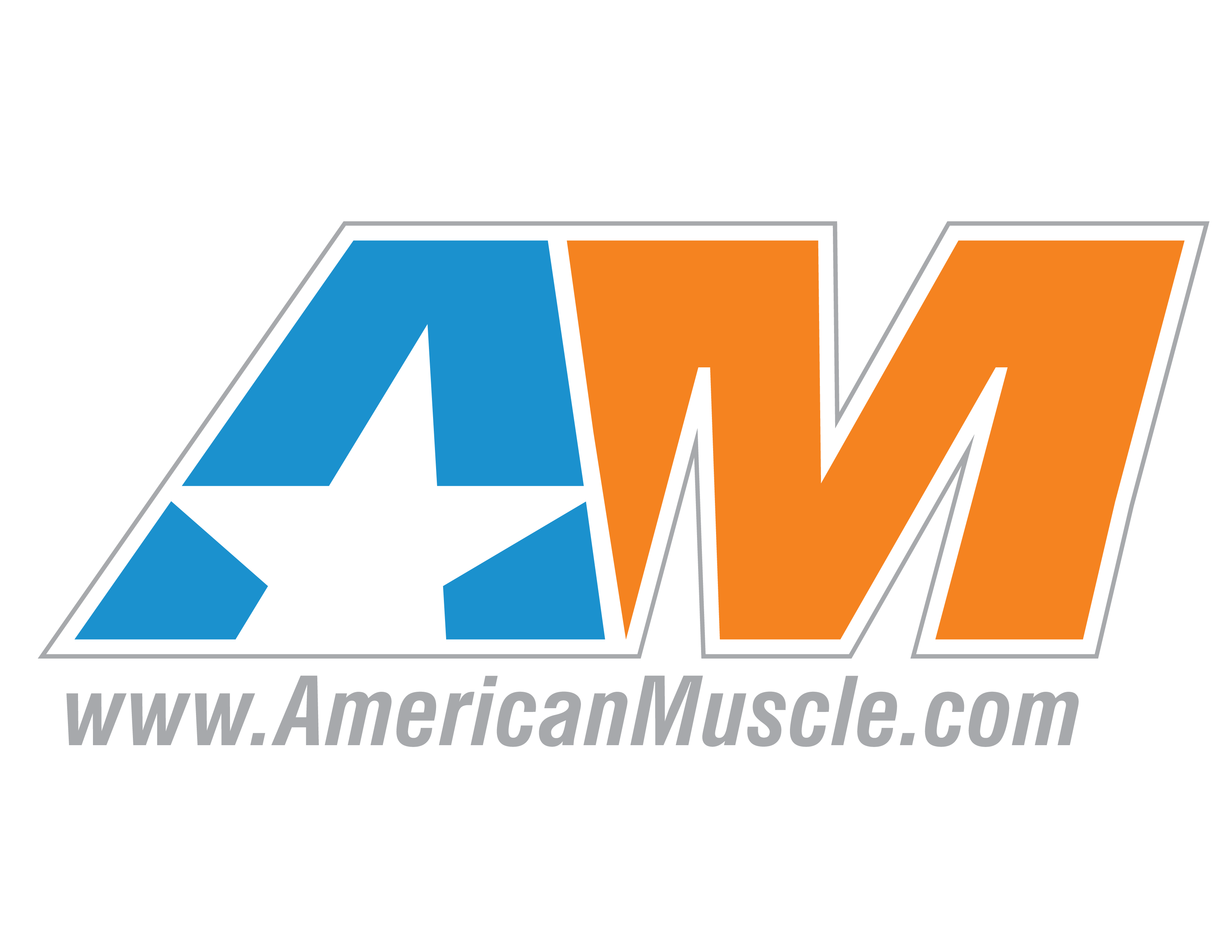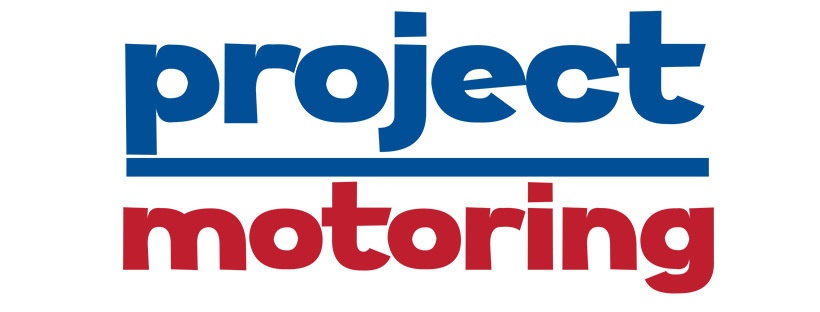Using skills honed over two decades performing in front of thousands, our guest understands what it takes to engage, motivate, and inspire an audience. She speaks on topics ranging from women’s empowerment and leadership to motivating sales teams to perform at their highest level. Her speaking style is inclusive, engaging, and witty, keeping audiences learning and laughing at the same time.
Since leading her first auction in 2001, Lydia Fenet has taken the rostrum for over fifteen hundred auctions, gracing stages and engaging audiences all over the world. Car lovers will recognize her as Broad Arrow’s Principal Auctioneer at Monterey Car Week and Amelia Island, and we are very flattered that Lydia has joined us to share her… Road to Success.
Spotlight
Lydia Fenet - Founder, CEO & Auctioneer for Lydia Fenet Agency
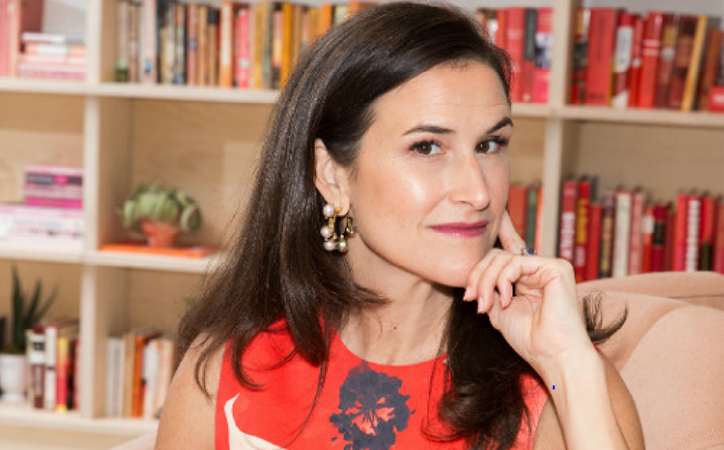
Lydia Fenet is the founder and CEO of the Lydia Fenet Agency, a boutique agency representing best in class charity auctioneers.

Contact: Lydia Fenet at lydia@lydiafenet.com | N/A | Visit Online!![]()
![]()
![]()
![]()
Notes
- Let’s go back to the beginning. No one goes to school to become an auctioneer, or do they?
- You didn’t start off in “car auctions” – take us on that journey. How did you end up at Broad Arrow?
- The “classic” or Hollywood auctioneer 50-50-50-do I have-55-do i hear 55… and so on; that’s not your style, how does it differ, and why?
- You’ve also branched out into podcasting, though we won’t count this as an official crossover episode, tell us about Claim Your Confidence.
- n your recent book, you cover practical ways to combat the dreaded imposter syndrome. You’ve got a great mnemonic for it, “SLAM”. What is ‘SLAM,’ and why is it so key to acting with confidence?
- If a young woman walked up to you at the next Broad Arrow Radius event as asked “why do you do this? How can i be you?” what would you say?
and much, much more!
Transcript
[00:00:00] Break/Fix podcast is all about capturing the living history of people from all over the autosphere, from wrench turners and racers to artists, authors, designers, and everything in between. Our goal is to inspire a new generation of petrolheads that wonder. How did they get that job or become that person?
The road to success is paved by all of us because everyone has a story. Using skills honed over two decades, performing in front of thousands. Our guests understands what it takes to engage, motivate, and inspire an audience. She speaks on topics ranging from women’s empowerment and leadership to motivating sales teams to perform at their highest level.
Her speaking style is inclusive, engaging, and witty, keeping audiences learning and laughing at the same time. Since leading her first auction in 2001, Lydia Fennett has taken the rostrum for over 1500 auctions, gracing stages and engaging [00:01:00] audiences all over the world. Car lovers will recognize her as Broad Arrow’s principal auctioneer at Monterey Car Week and Amelia Island.
And we are very flattered that Lydia has joined us to share her road to success. And with that, let’s welcome Lydia to Break Fix. Thank you so much, Eric and Lauren. I’m so excited to be here. And joining me tonight is our newest co host, Lauren Goodman, supervising producer of media and exhibitions from the REVS Institute.
So welcome to the show, Lauren. Thank you. Happy to be here. Well, like all good break pick stories, there’s always a super heroine origin story. So let’s talk about the who, what, when, and where of Lydia. Let’s go back to the beginning. And I’ll preface that by saying no one goes to school to become an auctioneer.
Well, in my case, I did not go to a school to be an auctioneer. I read an article in college in Vanity Fair magazine about a place called Christie’s Auction House in New York City. I grew up in Louisiana. My parents were not art collectors. I was not aware that there was an art world where things were not hung on a [00:02:00] wall like they are in the museum.
You know, I didn’t realize that people transacted art in much the same way they transact many things. And so I read this article about Princess Diana’s dress is being sold at a charity auction in New York City at this place called Christie’s. And everybody who worked there was glamorous and traveled the world and had access to this incredible art.
And I became completely mesmerized by this world. And as a result of that, I really started to dig in and try to learn more. And again, this was before the internet. I know many of your listeners are probably quite youthful and perhaps that was not the way that you went to college, but the internet was just coming out when I was.
Graduating from college, frankly. And so I really use a lot of word of mouth marketing and question asking pretty much anyone I came in contact with to find out more and more about Christie’s. And eventually I was able to secure the information for the internship coordinator. And I called her. Almost every day for two weeks to try to get an internship, which at that time was completely full because in New York city, people start looking for internships a year out.
And I was about two months out before the [00:03:00] summer and I was just wore her down with persistence. I just kept calling day after day and I did not take the answer that the internship was full. I took the answer that the internship was full, but eventually I was able to seek for that summer and I really never left.
About four years into my time at Christie’s, auctioneering tryouts were open to the entire company for the first time. Up until that point, it had only been officers in the company. Pretty much everyone there ended up being sort of in their thirties and forties. They had families, they had lots of commitments.
And as a result of that, there were times where they couldn’t make it to auctions, especially charity auctions at night. And because this happened a lot in my fourth year at Christie’s. They opened it up to the entire company and I marched myself right downstairs for tryouts and spent four days doing exactly what everybody else was doing, sort of pretending to be an auctioneer, like the auctioneers that we had seen.
And at the end of four days, I was one of four people still standing. They passed all four of us. And I was on stage, I think the next week in Kansas City crying out what I learned in those classes. And that was kind of how it all started. Does every auction house have their own class, their own [00:04:00] style that they teach the people that there are part of their organization?
Yes, there are two types of auctioneering and an auction house are two types of auctioneers. There are auctioneers and charity auctioneers. And when I was training, it was pretty much guaranteed if you were an art auctioneer that you were a charity auctioneer, but it was not the same if you were a charity auctioneer.
So the stakes to become a charity auctioneer, frankly, were a lot lower. And that was kind of how I got my entree into the world of auctioneering the time. I think there were maybe two female auctioneers and they were taking the sales that Seemed really underwhelming to me, the sort of book sales in front of maybe two or three people.
It was like a half to completely empty sale room versus the big blockbuster evening sales that you see on the cover of the New York times where people are selling a billion dollars. Those were never women. Whereas the charity auctions, those stages were kind of open for anybody who would get up there.
And I got on stage and I started doing everything auctioneering class, which was selling things that nobody wants at 11 o’clock at night. Like you would sell a Picasso and as you can imagine in a room of [00:05:00] crowded people who’ve been drinking all night when you’re acting really serious and trying to sell a puppy at 11 o’clock at night the way that somebody would try to sell a Picasso, you’re going to get a kind of muted reaction to say the least, but because that was the way I had been taught and frankly, Because I was a woman and I felt really uncomfortable doing a job that most of the people were like, wait, who’s the real auctioneer?
I have to sort of laugh like, I’m really the only person here who’s going to be able to do it. So if you want an auctioneer, I’m your only choice. You know, that was really my attitude for about eight years of my auctioneering. Nope. It’s yeah, I’m still the person. It’s going to be me. Sorry. There’s no one else coming to save you.
About eight or nine years in, you know, I was taking at that point, 50, 60, 70 auctions a year. I mean, I was on stage pretty much every night during auction gala season just because nobody else really wanted to take them. And I just didn’t feel like I was good and I wanted to be good. And for me, that always equates to practice just learning what is it that makes an audience pay attention.
What is it that keeps them coming back? How do you push an underbidder a little bit harder? That’s all learned from practice. That’s learned from standing on stage and having people talk over you and realizing that maybe this [00:06:00] joke will make them listen. Or maybe if I say this, or perhaps silence is the answer.
I was probably almost a decade into my charity auctioneering career. So if you can imagine somewhere between like five and 700 really mediocre charity auctions where people just talked over me. I had a night where, frankly, I felt terrible. I wasn’t feeling good, and I called all the other auctioneers, but it was a Saturday night, and they all sort of said, listen, you take the auctions nobody wants, and nobody wants to take an auction on Saturday night, so nobody’s taking your auction.
And I remember rolling into the Central Park Boathouse, and I was so sick. I was sitting next to the podium, like, literally dying from what felt like the worst flu ever. And I didn’t have that adrenaline boost that put me back up to the place where I pretended that I was an older British gentleman selling Picassos at 11 o’clock at night.
And I just became kind of a sassy late 20 year old woman, which is who I was at the core. And I started tearing into the audience just with total abandon the way that I would with my siblings, like making jokes about people making, you’re just having fun. And in a way it was the first time I’d ever seen an audience pay [00:07:00] attention.
And I’d ever seen them react in the way that I had always wanted them to react. And I realized that just because I’d already seen something done in a certain way didn’t necessarily mean that it had to be done that way. For me, that night was such an aha moment, and I never looked back. Honestly, if that had been it, you know, if I’d done that night and that had been it and nothing had ever come of it, that would have been fine.
I would have had that great night on stage. But what happened was that quite quickly, the chairman of Christie’s called me and said, I got a call from somebody who was asking for that woman they saw. And that must be you, because nobody else is taking auctions at 11 o’clock at night, except for you. Would you want to go take this one?
And then it got to the point that The senior guys who never really felt comfortable charity auctioneering, because they were really established art auctioneers and they loved the formality of the increments and they loved the roster where they stood. Whereas I loved the big stage where I could walk and grab a microphone and, you know, call people out.
All of those things I realized became this differentiator for me. And it was making a difference for the charities. You know, they were making twice as much as they had the year before [00:08:00] just by having something completely new and different on stage. And I really found my footing and I just accelerated into it.
So the auctioneering tryouts that I was telling you about, the sort of four days of survivor where you just get cut day after day until a few people are left. I taught that class for over a decade at Christie’s and I got to handpick the charity auctioneers out of them. It really is amazing to me. And still, even as I entered into car auctioneering, which for me just happened this past year.
Is that same feeling of doing something differently and showing people that it can be done differently and it’s not good or bad. It’s just different. It almost sounds like you had the education of a standup comic, which is you have to go out and bomb for years and years and begin to learn through practice.
How do I personally, how can I authentically manage an audience, which is for you, you learned how for 10 years, how. It wasn’t working. And when you tried something new, you said, Aha, something feels natural here. Something feels like almost not work, even though it definitely is work. Is there anything else that you found besides just the practice and the bombing?
Another [00:09:00] discipline, let’s say, that helped you hone that particular approach that felt authentic to you? One of the most important things is self awareness about your performance. When you get on the stage, I talk about in one of my books, Really having this feeling constantly of seeking the approval from the audience.
I can remember so many times getting off stage and somebody would grab my arm as I walked past their table, completely deflated after a really mediocre auction. And they would say, Oh, it was a tough crowd. And I would think to myself, Oh, my God. They know how badly I did. Like, and it was just this spiral.
I would leave in tears, just, Oh, I couldn’t control the audience. It was so bad. And now when somebody grabs my arm and says that I usually grab their own back and say, I’m a charity auctioneer. There’s no other crowd. Like there is no crowd. That’s easy. This is what I do. The skill that I’ve established over this time is this discipline of assessing how my performances grow.
You know, I can tell you when I get off stage on a scale of one to 10, where I did that night. I will give it my all every single time, but I can always look back on a performance and think, I could have said that at that moment. [00:10:00] I should have said that at that moment, or I’m going to use that in the next one.
That joke really worked kind of like an improv standup. I have a whole group of jokes that I can go into when things aren’t going well. And I have a whole group that I can lean into when they are going well. depending on how the crowd is doing, how to encourage them, how to maybe give them a nudge, how to give them a nudge with a hood and a wink, you know, what it takes to really get them to come back to me, especially when they’re tired and they don’t want to be there anymore.
We are here to talk about cars as well as auctioning. And so part of your journey goes from Christie’s. To broad arrow, why don’t you take us on the rest of this trip and explain how that came to be? I can’t tell you how surprised everyone was. And no one was more surprised than me. I’ll be honest. So in the beginning of 2022, I was transitioning from a full time role at Christie’s into an ambassador position, meaning I wasn’t going to be running a full time team, which I’d been doing for the company for over two decades.
At that point, I was just going to be a charity auctioneer for them. That for me was really about being able to create this platform and to [00:11:00] continue building it outside of the four walls of the company that I grew up in that I love so much. The beauty of that was that I was going from a full time role to a consultant role, which really cleared the deck for anything else that I wanted to do.
As you can imagine, having worked at a company for so long, it’s weird to lose that part of your identity because for so many years, I mean, really since college, everyone’s like, well, Lydia works for Christie’s ex. And it was always about Christie’s. What I really wanted to see was what happened as I started to drop that and to shed that identity.
And so I had the ambassadorship. I could continue taking auctions as a charity auctioneer from Christie’s, but that left a lot of room. I’m a big believer in business that we’re always looking for the white space. I never say no to anything. I don’t really think of anything as failure. If it works great.
If it doesn’t, it was a learning lesson. And so as I left Christie’s, there was a gentleman who knew Ian, who is the head of marketing for broad arrow and broader, it was really just launching at this point. I mean, they were. Gearing up for their first sale at Monterey during the pebble beach week. And I didn’t really know that much about it, but I got an email from this guy named Ian and just asking if I would have breakfast with [00:12:00] them.
They were thinking about trying something new from an auctioneering standpoint. They’d watched a lot of my videos on YouTube, which by the way, I didn’t even know I had videos on YouTube. So the whole thing was just kind of making me laugh. And I honestly was laughing as I left that morning. I was laughing at my husband.
I was like, yeah, can you even imagine like a car auctioneer? You know, what is that? We went out for breakfast that morning. This is why I will say to everyone who is listening, like you should always take a meeting because timing is a really weird thing. And Ian and I sat down and I think we spent almost two hours talking.
At first, I was like, this is not something I would ever consider. And by the end of breakfast, I was, I couldn’t stop thinking about it. As I left Christie’s, I’d also had conversations with Sotheby’s, and it was a little sticky because Sotheby’s, RM, and Broad Arrow had parted ways. And so that in itself was its own thing.
Did I eventually want to go to Sotheby’s if I left Christie’s full time? I mean, these were all just things going around in my head. There were so many different components. And I will say one thing that I have loved about the Broad Arrow team since the beginning is They are very forthright. [00:13:00] There’s no ambiguity.
They were like, we want you. You tell us what you need to make that happen. I kept thinking of things that I could throw in there that maybe would make them say no. And they just never said no. I think when you realize that somebody really wants you for what you do, there’s nothing as flattering. And they had nothing but faith in what I did.
And that to me, after so many years was just such an incredible moment of clarity. I was like, you know, I’ve created something that somebody really wants. And here we go. We’re on the same page. And I’ll tell you, I walked into that sale in Petal Beach or at Monterey in August of 2022, and it really could have gone either way.
I stood up on that stage and it didn’t feel like every single person in that audience really wanted me on that stage. I can tell you just looking into the audience, it felt a little bit like my first charity auction. I feel like the guys at Broad Arrow knew that they could not have been nicer. It was anything I could think of.
They were like, what do you need? They know I drink Diet Coke. Do you need a Diet Coke? Do you need more water? I mean, it was like anything. At one point, I think we were selling a princess carriage. I was like, if you guys could just get the princess carriage, I think we’d be all set. I just [00:14:00] need a new car to be your auctioneer.
That’s all I need. And at the end of that sale, I think we both felt like it was a fit. Over the past year, I took five sales with them from year over year, Monterey to Monterey. I think every single one, we just got closer and closer and closer to a lockstep this year at Monterey. I mean, I was on stage for two days, five and a half hours each day without a break.
And there was never a point where I felt like either one of us didn’t know what was happening. You know, we figured out every one of our hand signals, you know, it’s all, it’s its whole language, car auctioneering. It’s been such a blast. I cannot even tell you how much I love working with the team, and I’m so excited to be with them.
I just flew out this past weekend to take the Peterson Museum, and they all showed up to support it, and it’s just great. I love it. I love the car world. I love the people in the car world. I love learning about cars again. Who knew? And I was kind of thinking to myself, you know, charity auctions, art auctions at Christie’s, you couldn’t be any more diametrically opposed to cars in a way.
Has there been a huge learning curve? How are you preparing for these auctions? How are you studying? Do you have [00:15:00] somebody coaching you on what to say? And not just, it’s a red Ferrari from 1968. Like, how are you prepping for these versus what you’re used to in the past? It’s amazing. I mean, it really is, as I said, and you just said this too, it is its own language.
So there’s a ton of prep work that goes in. The catalogs are sent to me in advance. I pour through them. I’m basically reading all of the essays and everything about the provenance, but a lot of it similar to the art world just comes from osmosis. You know, walking around with a specialist during the specialist meetings.
We were laughing during one of the early interest meetings before the sale where we were flipping through the cars and I saw this one car and I was like, Oh, this must be like, you know. The car that’s not going to sell. And everyone was like, Oh, there are 11 people who are interested in buying this car.
And I said to Alan, the reader from broad arrow, I kind of whispered. I was like, really? I thought this was like the dump of the sale. I didn’t think anybody, he just started laughing so hard. And he had to tell everyone at broad arrow that I’d said that because they just thought it was so funny. Every single one, if I say something like that, they’re like, let me tell you why, you know, they’ll laugh, but then they’re like, but no, let me explain to you why this is [00:16:00] important.
Let me explain the provenance. Let me explain what makes this type of car, this curve, this angle. And it’s really incredible to understand more. And I find myself every time I’m with them, looking at a car. And thinking to myself, Oh, that’s the reason that that one is going to sell for more. Or I understand that because of this part of this history of this car, this particular year is going to be the one that’s going to sell.
It’s like wine or art. It’s all a similar pattern in many ways, but at the same time, it’s completely different. So I’m going to take the opportunity to ask you a pit stop question with respect to the fact that now you’ve been through two Pebble Beach seasons. Is there a sexiest car? of all time, or most beautiful, however you want to phrase that.
I took a sail down at the Porsche Center in Atlanta. I think as a result of that, I’ve kind of fallen in love with that car. I don’t know if I’m going to get completely alienated by the car community for saying this. I don’t know what a good car is versus a bad car. I can just tell you, I think that a 1960 Porsche is a very sexy car.
And if anyone is giving those to auctioneers, please know that I would be [00:17:00] a grateful recipient. You mentioned earlier, as part of your origin story, this Idea this picture that was painted about what auctioneering would be like, and I think many of us might have that same sort of fallacy about the world that you live in and you work in.
And for most of us, it’s that, you know, classic, you know, Johnny Cash, 51, 52, 53, and we’re going through the numbers and it’s like a rodeo auction in a way. But I take away this illusion that it’s like the red violin. If you’ve ever seen that movie, very sophisticated, very high brow and those kinds of things.
Is it really like that? What is the auctioneering world like for those that have never attended one? I think it all depends on what type of auction you go to. You know, it even depends on the auctioneer who’s on stage. I worked with a broad arrow auctioneer up in Gloversville when we were selling the collection of Jim Taylor, who he is trained as a traditional car or cattle auctioneer.
I mean, he is ripping through the increments. Everything is a chant. It’s a completely different style than the style that I use. I think at Christie’s it [00:18:00] is very Red Violin esque. There’s so much that goes on behind the scenes. There’s so many things that you would never even imagine when you watch an auctioneer.
There are mathematical increments that are flying through your head. There are reserves that are set by the buyer that you can’t exceed. There are so many things to think about, and I think a really talented auctioneer would never show you that. So to that extent, I do think it’s a little bit like the Red Violin.
I think the car auctioneering is a little different, but at the end of the day, it’s all the same. You as the auctioneer are essentially the conductor of the orchestra and everybody’s looking to you to ensure that it’s going well. And one thing I’ve always said about training auctioneers, it doesn’t matter if the sky is falling, keep a smile on your face because nobody knows that things are going wrong unless you show them.
And I truly think that that’s really what auctioneering is about. It’s like, you’re figuring it all out. You’re the duck with their little feet paddling as fast as possible underneath, but on the top, it’s supposed to look elegant and seamless and beautiful. Speaking of which, when you’re talking about the preparation, especially for something like [00:19:00] Amelia Island and Pebble Beach, those are momentous occasions.
Those really are anchors in the calendar. It is a lot of pressure. Some of the press that came out about this past year’s Monterey Car Week was a little bearish about, oh, like maybe sales are kind of down. But I’m also wondering a little bit if when you’re looking at your audiences and maybe because cars is a newer thing for you, you don’t have the years under your belt to be able to compare.
But maybe also the audience you’re talking to is changing. It’s something we’re talking about with cars. And maybe what they’re into is also changing. So just like the status quo, like, oh, auctioneering means you talk like this. But wait, why does it have to be like this? Maybe also looking at the market.
Okay, the kind of people who come to the car auction are this. Well, maybe they’re actually moving a little this way or a little that way. Is that a trend that Broad Arrow is talking about? Like all companies right now, one of the most interesting things to consider is the online market. You know, I think that that’s in any auction business is crazy not to look at the online market and think, how can you push [00:20:00] boundaries?
How can you entice new bidders? Because the more bidders you have, whether online or in the room or coming in, frankly, on the phones. The more chance you have to get an underbidder and it was the auctioneer. That’s all I’m looking for. I’m looking for the person to push ultimately the person who wants it.
I’ll probably get it, but how far can I push them up? You know, I think that the markets are changing. I think to be savvy, you have to keep up with that. There does still seem to be an appetite in the car community. As far as I can tell when you’re in, in the community around it, people want to be there for the rallies.
They want to be there for the early morning donuts. You know, they want to be there for all those moments. In the calendar to see one another and to bond over something that they all love, which in this case is the car community. Again, I come from the art world. It’s a very similar thing in the art world.
You know, if I was in Hong Kong, London, or New York at a certain time of the year, I would always bump into people because they were there for the sales. I do think that that’s the beauty of these communities. And hopefully the answer is you’re bringing in younger, more energetic buyers, as well as courting the people who’ve been there for a long time.
And that knowledge is being passed down generation over generation. Not [00:21:00] only have you been an auctioneer, you’ve run your own agency. Now you’re involved in the car world. You’re also into podcasting. And though we won’t count this as an official crossover episode, tell our audience a little about your show, claim your confidence in what it’s all about.
During COVID, I, like many people, was a little stir crazy. I’m a complete extrovert in every sense of the imagination. And so it was really difficult being at home without anyone, except my kids and my husband in four walls and homeschooling and running a team and all the different things that we were all juggling at that point.
And a nonprofit that I had worked with for a long time reached out to me called the River Fund. And said, listen, we can’t do our auction this year and we need cash. There’s a food pantry line that is going around the block four times. It’s dire. Is there anything you can do? And I’m just sort of sitting there and I was like, listen, I could start interviewing people and ask people to donate to the river fund if they were interested in listening as just something to do.
And my first book [00:22:00] that I wrote was called the most powerful woman in the room is you. And in that book, I have case studies from different women who. Just basically gave knowledge about things that had happened in their life. People like Martha Stewart, Barbara Corcoran, Arianna Huffington. So I just emailed every single person I could think of and said, listen, if I was to set up this Instagram live 4 PM every afternoon during COVID, would you come on?
And I can just ask you questions about what you’re doing because we’re all kind of struggling and I’m sure tips could be used COVID.
And then Rockefeller center had seen that happening. One of the women who worked in Rockefeller center. And so when they opened a podcast studio, they called me and said, listen, we have this podcast studio. We would love for you to bring the most powerful woman in the room is dot, dot, dot to Rockefeller center.
And I actually sold my first book to Netflix. So I don’t own that name anymore, but I just written my second book called claim your confidence. My podcast idea was really simple. I live in New York. I bump into powerful women all the time. I thought, why not just interview them and ask them what it was like and what they are like as it [00:23:00] pertains to confidence.
If they’re confident now, if they grew up that way, what it took them to get there. And a lot of times you find that people may have had confidence. They might’ve lost it along the way, but we hear those stories on the podcast. So I’m coming to the end of season one, January 31st, and I’m opening up season two to men and women.
Henryk Blundquist, the New York Rangers goalie, is going to be my first guest on season two. So we’re going to start it in a new direction and talk about confidence with men and women, which I think will be really interesting and open the conversation to a new audience as well. Well, speaking of confidence in women, is that how you came to Slam.
The slam. Slam your imposter syndrome. Yeah. You know, I, I’m a writer. I write to a white space. I write about everything that’s going on in my life. I mean, it’s almost like a diary that just keeps going. And because there have been so many seismic shifts in my life in the past five years, those all become fodder for chapters.
And imposter syndrome was something that I felt so much when I was younger. All the time. I can remember sitting in meetings and walking in and just being like. I’m never going to [00:24:00] open my mouth because everyone’s going to be like, who is that woman sitting in there? He doesn’t have anything to say, or she’s not saying the right thing.
And I say a lot in the book, like nobody thinks that it’s what we think about ourselves and how we fill our minds with who we are and the space that we take up. And so slam your imposter syndrome was really just about. Stopping those negative thoughts about ourself, listening to what people say, accepting, as I said earlier, that we give ourselves a gold star.
Nobody else gives you a gold star for living the life you want and making our point and not backing down when you know you’re right about something. And it seems intuitive, but sometimes just hearing somebody else say it is all you need, that and having a gavel and being able to slam it down. Those two things are always very helpful for me.
I do need more gavels in my life. I think that’s going to help me a great deal at my own job. So I’m going to adopt that. Well, Lauren, I will tell you as a salesperson that today I launched a gavel charm necklace called the strike method to give you confidence when you don’t have it. So for those of you who are out there and you want a gavel to wear on days when you don’t feel so [00:25:00] great, or you just need a little confidence boost, I literally launched it today.
And I would say for all the. Dad’s daughters out there as well. I launched it on both of my daughters because I want them to feel confident and ready to go at anything for anything. Oh, that’s wonderful. I love that. I love that. I do want to touch on though. I really liked the, what really stuck out to me in slam was listening to what people are saying, not what you think.
They’re saying, and I felt personally attacked by that advice, but thank you for calling me, calling me to the front like that. But could you just expand on that a little bit for our listeners? So I had three children in a row as some of us do in life. I had them all within four years. I had been working at Christie’s for 13 years when I had my first child.
It was definitely on my mind. I didn’t even tell anyone I was pregnant with my first child until I was well into my fourth month, just because I didn’t want to be counted out. This was 10 years ago. So it wasn’t the conversation that is taking place today. And I really can’t tell you how many times [00:26:00] people would say things to me and I would take them in the worst way possible.
And I say in the book, really good guy friend of mine who I’d worked with forever. And I have a really, really, like, I love a sense of humor. I have two brothers and a sister, and really all we do is just make fun of each other all the time. So I’m always down for being made fun of. I’m always down for making fun of other people.
But my guy friend, as I walked in, said something about, I can’t even remember what the exact sentence was, but it was something like nice to see you back here or something like that said in the most innocent way possible. And the spiral of negativity that came out of that comment to me, all I could think of was.
Oh, he means that I’m not here all the time because I have three kids at home. He must be thinking that I’m not here anymore and that I’ve taken all these maternity leaves and what a slacker and just on and on. And so I say in the book, listen to what people say. And also if you’re going to have a narrative.
Make it a good one, right? Why do I go down that negative spiral? I say in the book, what I should have said to myself is like, he said to you, like, how are the kids at home? Like glad to see you back or something. [00:27:00] And what I should have said was Lydia, great to see you back here. God, three kids at home and you’re still put together and getting into work on time.
Like, here’s to you. What’s wrong with that story? Why give myself the opposite one? So if you’re going to make up a story, Make it a positive one. But first and foremost, listen to what people say and don’t assume based on where you are, what you’re thinking that what they’re saying is not nice or negative.
I think that’s actually the perfect segue into this next question, which we have reformulated for different guests on the show, especially women in the auto sphere to ask them. a perspective for a younger version of themselves, or my daughters, or your daughters, or anybody else’s that are out there. So if a young woman walked up to you at the next Broad Arrow Radius event and said, Lydia, why do you do this?
And how can I become you? What would you say? First and foremost, send me a video and I can either Help you learn how to be an auctioneer or I can represent you as part of my auctioneering agency. No, I’m kidding. You know, I would just say to them, listen, if this is something that you’re passionate about, [00:28:00] there are definitely auctioneering schools that you can go to.
Most importantly, start public speaking. That, for me, is always the key to good auctioneering. Take an improv class, get comfortable being on stage, and then start learning about cars. Start educating yourself about this industry that you want to be in. Same with the art auctioneering. If it’s something that you want to do, do the work.
Because at the end of the day, there is absolutely no substitute for doing the work. And once you do it, you’ll realize that the more you do, the more successful you’re going to be. So if you want to be an auctioneer, I would say start taking some public speaking classes. Take a couple of improv classes, start taking an auctioneering school.
If there’s one close to you, if not, just start watching videos. None of this is rocket science. It’s just practice and getting comfortable on your feet in front of people. Well, with that, Lydia, any shout outs, promotions, or anything else you’d like to share that we haven’t covered thus far? Well, I say to everyone, I am busiest on Instagram, which I, Live on because I think it’s such a fun thing.
And also my mom watches it in that way. She always knows where I am, which is [00:29:00] helpful. I have two books, the most powerful woman in the room is you and claim your confidence, which are both available on Amazon. And as you mentioned earlier, I have a claim your confidence podcast. So be sure to tune into that, but otherwise you will see me back on stage with broad arrow and Amelia in March and next year in Monterey as well.
And I think we have some other sales 2024. So if you’re looking for me in the car world, that’s where I’ll be. Lydia Fennett is the founder and CEO of the Lydia Fennett Agency, a boutique agency representing best in class charity auctioneers. Over her two decade long career, Lydia served as the Global Managing Director of Strategic Partnerships for Christie’s and reshaped the fundraising landscape as the world’s leading charity auctioneer.
She has single handedly raised over 1 billion for more than 800 organizations and broken down countless barriers for women in the auction industry. To learn more about Lydia, be sure to pick up a copy of her book, Claim Your Confidence. Visit her website at LydiaFennett. com or tune into her podcast of the same name everywhere you [00:30:00] stream or listen.
You can also follow her on social media at LydiaFennett on Instagram and threads or connect with her on LinkedIn. And if that’s not enough, catch up with her at the next Broad Arrow Radius auction near you. With that, Lydia, I can’t thank you enough for coming on Break/Fix and sharing your road to success story with us and any women in the autosphere or petrolheads that are out there that are interested in this corner of the automotive world.
And one thing that I’ve noticed about this conversation and you exude it every time we’ve gotten together and talked, it’s that old adage. Do what you love and you’ll love what you do. And you epitomize that statement. And for those that haven’t seen Lydia in an action, I highly recommend it. So thank you again for what you’re doing and inspiring other automotive enthusiasts out there.
Oh, thank you, Eric and Lauren for the opportunity and thank you to all the listeners for tuning in.
We hope you enjoyed another awesome episode of Brake Fix Podcast, brought to you by Gran Touring Motorsports. If you’d like to be a guest on the show or get [00:31:00] involved, be sure to follow us on all social media platforms at GrandTouringMotorsports. And if you’d like to learn more about the content of this episode, be sure to check out the follow on article at GTMotorsports.
org. We remain a commercial free and no annual fees organization through our sponsors, but also through the generous support of our fans, families, and friends through Patreon. For as little as 2. 50 a month, you can get access to more behind the scenes action, additional Pit Stop minisodes, and other VIP goodies, as well as keeping our team of creators Fed on their strict diet of fig Newtons, gumby bears, and monster.
So consider signing up for Patreon today at www. patreon. com forward slash GT motorsports, and remember without you, none of this would be possible.[00:32:00]
Learn More
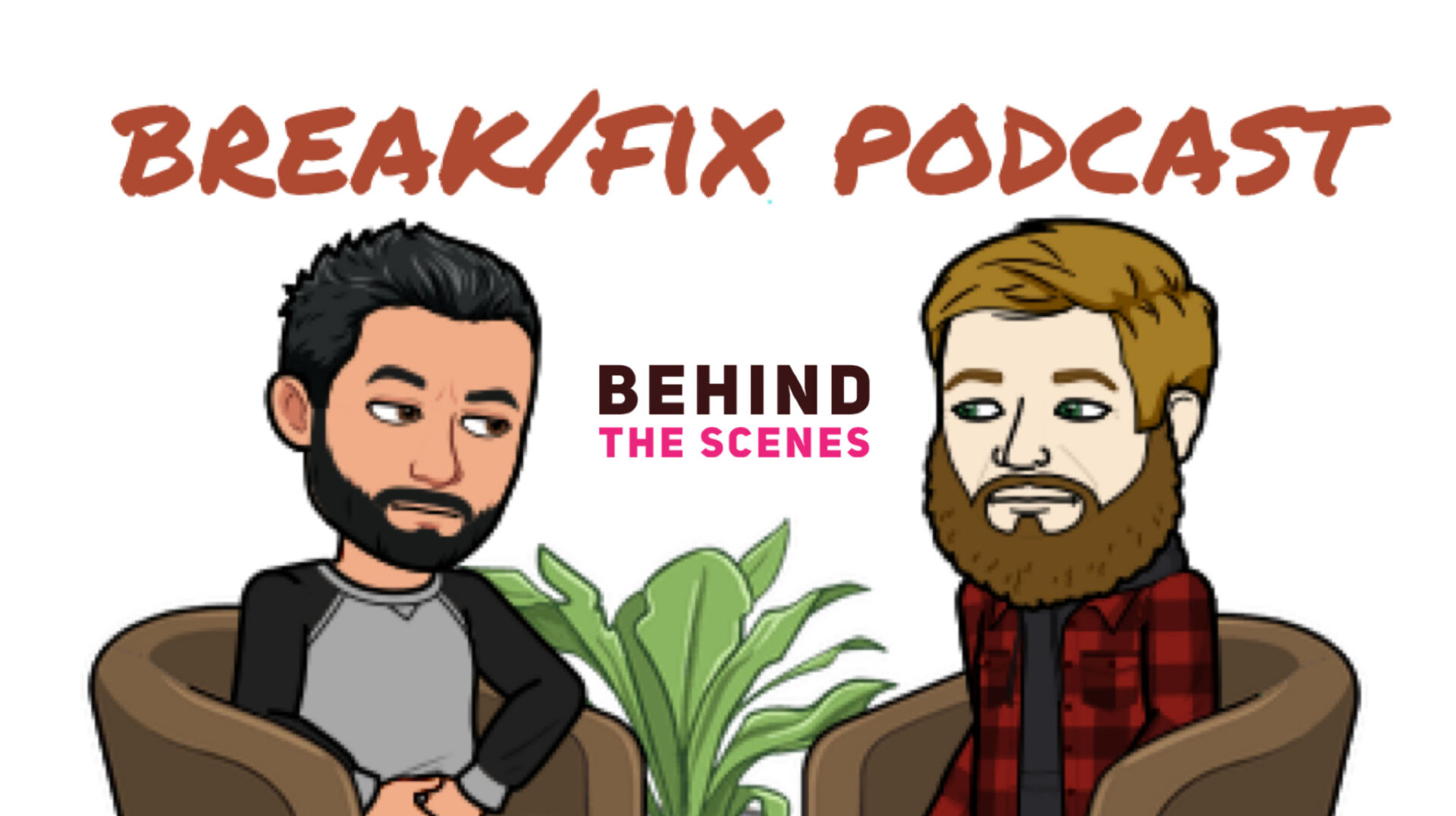
Consider becoming a GTM Patreon Supporter and get behind the scenes content and schwag!
Do you like what you've seen, heard and read? - Don't forget, GTM is fueled by volunteers and remains a no-annual-fee organization, but we still need help to pay to keep the lights on... For as little as $2.50/month you can help us keep the momentum going so we can continue to record, write, edit and broadcast your favorite content. Support GTM today! or make a One Time Donation.

If you enjoyed this episode, please go to Apple Podcasts and leave us a review. That would help us beat the algorithms and help spread the enthusiasm to others by way of Break/Fix and GTM. Subscribe to Break/Fix using your favorite Podcast App:
Lydia Fenet is the founder and CEO of the Lydia Fenet Agency, a boutique agency representing best in class charity auctioneers. Over her two-decade long career, Lydia served as the Global Managing Director of Strategic Partnerships for Christie’s and reshaped the fundraising landscape as the world’s leading charity auctioneer. She has single handedly raised over one billion dollars for more than 800 organizations and broken-down countless barriers for women in the auction industry.
Auctioneer & Author!
To learn more about Lydia, be sure to pick up a copy of her book Claim Your Confidence, visit her website at www.lydiafenet.com or tune into her podcast of the same name everywhere you stream or listen. You can also follow her on social media @lydiafenet on Instagram & Threads, or connect with her on LinkedIn. And if that’s not enough, catch up with her at the next Broad Arrow/RADIUS auction near you!


